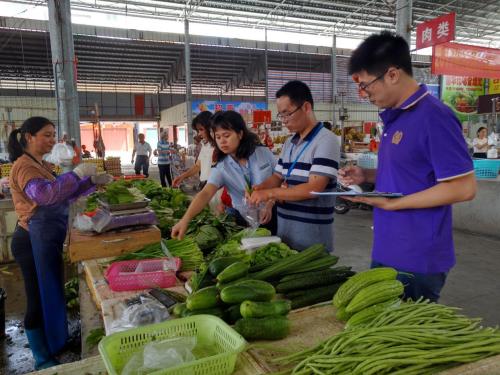Pesticide rapid detection of pesticide residues, rapid detection of pesticide residues, but 80% of pesticides can not be detected
Pesticide rapid screening biochemical method is fast and cheap, but 80% of pesticides can not be detected, how to ensure food safety? Let's take a look.
"Pesticide Quick screening" is also known as "biochemical Rapid Test method", referred to as "biochemical method", which boasts short testing time and low cost, and is widely used in major domestic markets, quantity stores, and food group caters. At present, there are about 370 independent inspection stations mentored by the agricultural examination institutes of R & D units throughout the station, together with other inspection stations that have not handed in data to the agricultural examination institutes, a total of 582. Compared with the officially announced "chemical method" (which can detect 373 pesticide residues), the biochemical method can only detect two types of pesticides, and its dosage has been reduced year by year. At present, there are 36 kinds of pesticides in circulation, accounting for only 18% of the total pesticides. Taosong, which uses the largest amount, is about to be restricted, and this proportion may fall below 15%. Biochemical laws have been questioned as outdated and a waste of resources.

However, compared with the chemical method, which costs 4,000 yuan and takes three days, the biochemical method is fast and low in cost, and many units still rely on the biochemical method to make independent checks before the goods. Kao Ching-Hua, head of the applied animal group of the Agricultural examination Institute, gives an example: "like the auction market, things will go out in a few hours, and it is impossible to use chemical methods. "the biggest limitation of the biochemical method is that only organophosphorus and carbamate pesticides can be tested. These two kinds of pesticides are gradually eliminated because of their high toxicity, but the new drugs with different action mechanisms, as well as the increasing use of fungicides and herbicides can not be detected by biochemical method.
In recent years, the Agricultural Drug and Toxicology Laboratory has developed the Raman spectrum pesticide rapid screening technology, which also boasts that it can be extracted quickly, and the results can be analyzed and read within 10 minutes, regardless of the types of pesticides. However, experts say it is unclear whether biochemical methods can be replaced in the future. Tseng Teh-chih, an honorary professor in the Department of Plant Diseases at Chung Hsing University, believes that testing is only a temporary cure rather than a permanent cure, and source management is more important. Weng Jieshen, former head of the residue control team of the Agricultural Drug Toxicology Laboratory, also stressed, "Why do you have to spend so much effort on 'whether it has been tested' and not to see if you are" useful "?
- Prev

What are the methods of using pesticides? What are the problems with microbial pesticides?
What problems do you encounter when using pesticides, don't you know? Let's see if there are any questions you want to ask. Let's take a look. Biopesticide refers to pesticides made from natural materials, such as animals, plants and microorganisms, which are harmless to organisms.
- Next

Pesticides: what are the hazards of pesticides? The banned fenpril insecticide poisoned millions of bees.
Millions of bees were poisoned by the banned drug fenpril! It is said that the central part of Puli Caotun has been victimized. Let's take a look at what this is all about. Fenpril small knowledge: both pesticides, animal drugs and environmental drugs, the role of neurotoxin, has an immediate impact on insects.
Related
- Fuxing push coffee new agricultural production and marketing class: lack of small-scale processing plants
- Jujube rice field leisure farm deep ploughing Yilan for five years to create a space for organic food and play
- Nongyu Farm-A trial of organic papaya for brave women with advanced technology
- Four points for attention in the prevention and control of diseases and insect pests of edible fungi
- How to add nutrient solution to Edible Fungi
- Is there any good way to control edible fungus mites?
- Open Inoculation Technology of Edible Fungi
- Is there any clever way to use fertilizer for edible fungus in winter?
- What agents are used to kill the pathogens of edible fungi in the mushroom shed?
- Rapid drying of Edible Fungi

